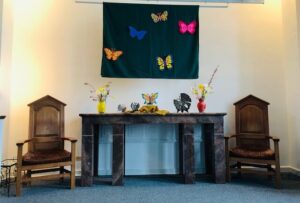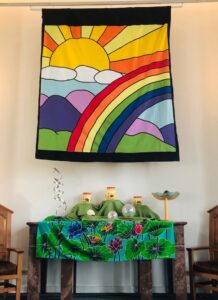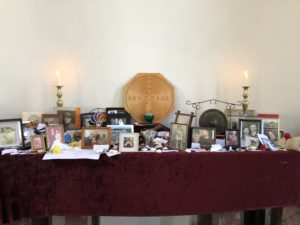Rev. Alex McGee led our service. Sermon: Truth as Skill
Good morning again.
Here we are on the 10th of November, as the weather is dipping below freezing and the leaves are letting go of the trees with raucous abandon. Tomorrow is Veterans Day. In three weeks, Thanksgiving will arrive, and then we face the winter holidays. To offer spiritual nourishment for the days ahead, this morning I am turning to wisdom from the Buddhist tradition.
Recently I attended a meditation workshop focused on how we communicate. In this modern day and age, with so much information available all the time, and communication happening at heightened speeds, we face a challenge: Are we communicating according to our values? Whenever we have new technology, we must ask ourselves that.
Why does this matter?:
It matters because Humans long for relationship. Humans long for inner peace.
But one of the things that interferes with this is when our speech disrupts both relationship and peace. Sometimes the tongue can be like a knife.
But, if we can find ways to use speech to enhance relationship and enhance inner peace, we are more likely to live lives that are fulfilling and contributing to the good of the world.
As an example, asking someone if they ‘will travel to be with family for Christmas’ might seem like a friendly greeting. But it assumes that -they have family, -that they have means to travel, and -that they celebrate Christmas. There are other ways to offer a friendly greeting that is more open, and might lead to deeper connection.
As another example, — an example which is all too fresh and painful — when people don’t trust communication from the government, there is great cost. People try many different work- arounds and cope in ways that are exhausting. In contrast, a society can function most smoothly if it trusts its government to tell the truth.
So, whether on a personal or social level, Buddhism addresses this because Buddhism is a philosophy about how our actions and thoughts shape our lives.
The Buddha taught that there are various things a person can do to avoid unnecessary pain in life.
One of them is Speaking Well.
Buddhism grew out of a worldview that examines how humans literally impact the world around them.
One of the ways we touch the world is with our words.
Consider this question: If we did not speak, how else could we impact the world?
Well, … we would still have our feet. We could walk through the world.
We would still have our hands and could create things with our hands, or destroy things with our hands.
We could eat things to continue to live, and in the act of eating, consume our environment.
And, we can procreate.
Other than that, there’s not much we do that re-shapes the world.
This line of logic is an ancient one, and helps show that without speech, our world would be a very different place.
Quite literally, the existence of our vocal cords, along with our brains’ capacity for language, along with our ears— connects together to create an amazing potential for great good or great harm.
Since our capacity to speak is so influential, it bears some careful consideration about how we do it. Especially since there aren’t many safety guards in place.
Consider a nuclear power plant.
There are daily safety checks.
Before an employee enters, they have to pass security.
Before switches can be flipped, a password is needed.
Before a critical action, a double check is required by two staff people.
In other words, there are pauses to check that the desired impact will occur.
The result of all this is that actions cannot be sudden.
And, yet, our tongues are not harnessed and checked in such a way.
According to the Buddhist philosophy, a time of daily mindfulness can be like the daily safety checks. A time of meditation allows a person to see if anything is out of whack inside, and take some time to get things back in balance.
And then, when a person returns to daily interaction, one is more likely to pause before speaking, to consider the impact.
Now all this theory sounds very good. Is it practical? I studied Buddhism as a major in college — ethics, history, philosophy, and meditation. I also lived for three months with a Buddhist family in Sri Lanka, and a month in a Buddhist Temple there. I learned that it is much like the Christianity in my home culture: the aspirations are noble; the way people live it out varies greatly!
The origins of Buddhism are that a man named Gautama attained a state of insight and peace.
As a result, people came to learn from him and lived together to practice meditation.
And, just like any group of people trying to do things together, they had problems.
So, he coached about how to communicate better.
Here is one example of what the Buddha said to the monks:
What are the five conditions that a monk must have before speaking to another monk?
“Do I speak at the right time, or not?
Do I speak of facts, or not?
Do I speak gently or harshly?
Do I speak profitable words or not?
Do I speak with a kindly heart, or inwardly malicious?”
That is a quote from the Buddhist teachings called Suttas, which are records of the Buddha talking to the monks.
PERSONAL
How can these ancient teachings be applied to our modern situation?
One can ask oneself these questions in family life. Recall the Buddha’s question about speaking at the right time. Newly married couples often go through growing pains of figuring out when to have difficult conversations and when not to. Sometimes silence is better if it takes the oxygen out of a fire that would only burn hotter and hurt someone.
I’ve heard it said this way: never miss a good chance to hold your tongue. Even if holding your tongue takes so much energy that you have to take a nap afterwards.
That can apply not only face to face, but also posting on facebook, writing an email, or sending a text. In fact, it is such an issue in our modern day that one blogger wrote an entire essay about her inner efforts to curb her impulses:
She writes: “It’s against my nature, but I’ve been working hard at digitally walking away, because … I ask myself before I posted something, and then I stopped when I knew that my reply was not kind or true, but most of all, it wasn’t necessary.” —Nora McInerny Purmot (blog Huffington Post, 3/3/2016)
SOCIETIAL –
As I said earlier, the issue of right speech is not only personal but societal.
One of the Buddha’s questions is whether one speaks facts.
Our social fabric is affected by how truth is spoken.
I want to share with you one case that I find particularly moving. I will paint a picture of the situation for you:
In honor of Veterans Day, a local event occurred here in Charlottesville this weekend. This event provided educational talks and displays by and about African Americans who have served in the military. If you think that sounds like something you wish you had attended, rest assured it is an annual event, so you can mark your calendar to attend next year.
One of the presentations was by a man named Dr. Asa Gordon, and I would like to share with you what I learned from him as he focused on the complex situation of this country in the months after the Civil War.
During that time, some states were allowing blacks to vote and some states were not.
A debate ensued: should blacks vote? If so, should that decision be made by states or as an entire national decision?
One voice in the debate can be found in a newspaper from Dayton, Ohio on August 1, 1865, in which a writer said this:
“We hold this truth to be self evident, that to him with whom we can entrust the bullet to save the life of the nation we can entrust the ballot to preserve it.”
Let me read that again for you. Listen: to how it speaks about a person who served in war but does not have the right to vote: “We hold this truth to be self evident, that to him with whom we can entrust the bullet to save the life of the nation we can entrust the ballot to preserve it.”
This writer was advocating for the federal government to allow all loyal black men to vote.
Why was that even a question in this so-called land of liberty? My friends, now if the original constitution had lived up to its stated values and included all people as voters in the first place, this problem would not have had to be solved.
But, instead, the writers of the constitution created a cognitive dissonance: which means: they said they believed one thing, but they acted another way. From the very beginning, the founding documents of this country were not truthful about liberty and equality. If we apply the standards of Buddhist speech: Some of the founding fathers spoke eloquently, but did not speak in a way that was genuinely helpful and kind or accurate.
It is very confusing to many school children to be taught that we live in a land of freedom and opportunity, and yet to see and experience many barriers and injustices. We owe it to the coming generations to shape our society to match our words: to be truthful, and to act from a loving heart in the construction of laws and policies.
I know that this might seem pretty heavy and deep and distant from Buddhist speech. But, the reason it is connected and it matters is because we have a chance in every moment of history to let ourselves contribute to more cognitive dissonance or speak truth to power. I hope we will do the second.
CLOSING:
In closing, we can see that speech in the large structures of government has an impact, just like speech in our daily relationships.
Here is a question of a well-lived life: how will we use this amazing capacity to speak?
1500 years ago, the Buddha encouraged his monks to speak truth, to choose the right time for speech, to speak with a kind heart, and to say what is helpful to the situation.
There is a modern tool in the English language to help remember this ancient teaching. Many people have found this tool helps them hold their tongue at the right moment, say the things that matter, and experience more peace inside and out.
The word THANK has the five letters T, H, A, N, K.
Each letter is a reminder of a quality of speech:
T for True
H for Helpful
A for Appropriate
N for Necessary
K for Kind
And since we are coming up on the holidays, when many people feel overwhelmed or stressed by interactions, I offer it to you for your holiday toolkit, as well as your social justice toolkit.
True, Helpful, Appropriate, Necessary, and Kind
Blessed be,
Amen.
My thanks to Donald Rothberg of Spirit Rock and the UVA Compassionate Care Initiative for the free workshop on Right Speech. Additional thanks to Beth Roth of Tricycle magazine for her article on October 13, 2017.












